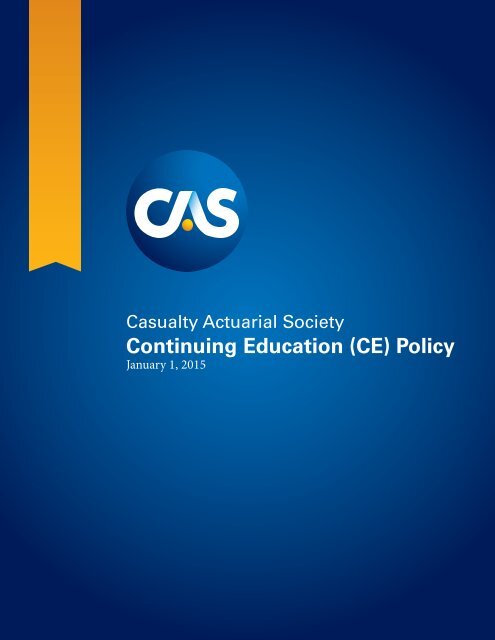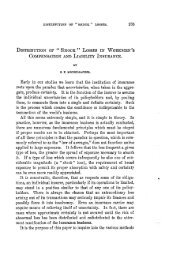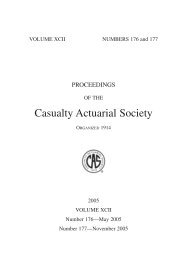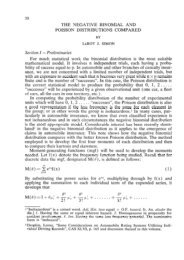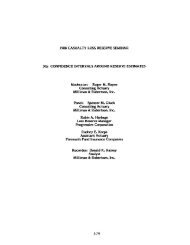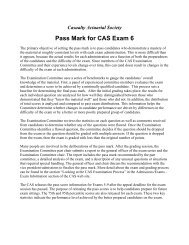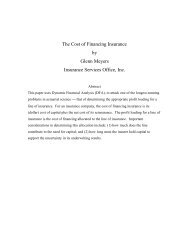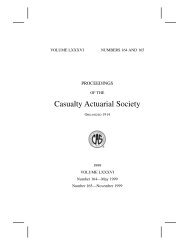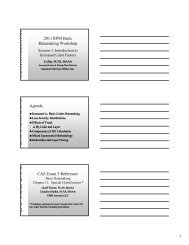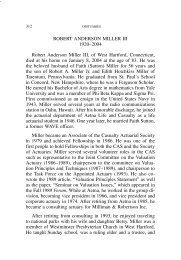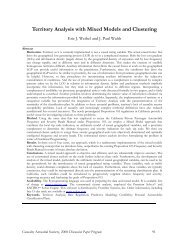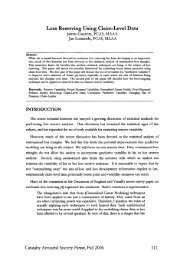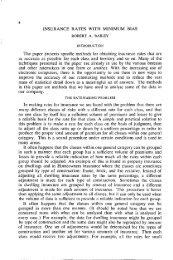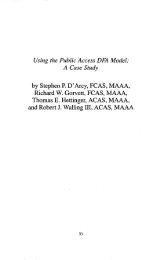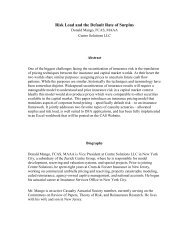Cas Continuing Education (CE) Policy - Casualty Actuarial Society
Cas Continuing Education (CE) Policy - Casualty Actuarial Society
Cas Continuing Education (CE) Policy - Casualty Actuarial Society
You also want an ePaper? Increase the reach of your titles
YUMPU automatically turns print PDFs into web optimized ePapers that Google loves.
TABLE OF CONTENTSINTRODUCTION...........................................................................................................1A. CAS CONTINUING EDUCATION (CAS <strong>CE</strong>) POLICY....................................3B. NATIONAL COMPLIAN<strong>CE</strong> PROVISIONS ........................................................5C. TRANSITION RULES..............................................................................................6CAS CONTINUING EDUCATION POLICYFREQUENTLY ASKED QUESTIONS..........................................................................7
CAS <strong>Continuing</strong> <strong>Education</strong> (<strong>CE</strong>) <strong>Policy</strong>INTRODUCTIONThe <strong>Cas</strong>ualty <strong>Actuarial</strong> <strong>Society</strong> Board of Directors approved the initial CAS <strong>Continuing</strong> <strong>Education</strong> (<strong>CE</strong>) <strong>Policy</strong> atits May 23, 2010 meeting. This 2015 revision is intended to simplify compliance for members, and adapt the CASpolicies to changing methods of delivering continuing education. <strong>Continuing</strong> professional education is an integralpart of any profession. The Board believes that the CAS <strong>Continuing</strong> <strong>Education</strong> <strong>Policy</strong> represents an importantcomponent in ensuring that CAS members stay accountable to their principals and the public by maintainingappropriate levels of relevant continuing education.Most CAS members who provide actuarial services must already comply with the <strong>CE</strong> requirements of a nationalqualification standard. For those members, there is no change and they should continue to comply with theirnational standard. The CAS policy has the most impact on those providing actuarial services internationally in ajurisdiction for which a local <strong>CE</strong> requirement does not apply to them, or for those in the US providing actuarialservices but not actuarial opinions as broadly defined by the Academy, both of which must still meet the CAS<strong>CE</strong> requirements by meeting requirements in one of the Recognized National Standards. In addition, this policyspells out certain member services the CAS performs, such as the review of selected member <strong>CE</strong> records, andestablishment of a documentation requirement.The Board believes that this revised policy should have minimal impact on most current CAS members, as itcontinues to recognize existing continuing education requirements from Recognized National Organizationsidentified in Section B, such as the American Academy of Actuaries and Canadian Institute of Actuaries (CIA)(Recognized National Standards). The only members that will experience a change to requirements due tothis revision are those using the Alternative Compliance Provisions of the original CAS <strong>CE</strong> policy, which arediscontinued in this revision. These members will need to determine the most relevant Recognized NationalStandard for them.The revised CAS <strong>Continuing</strong> <strong>Education</strong> <strong>Policy</strong> will first apply to <strong>Actuarial</strong> Services rendered on or after January 1,2016. To satisfy the CAS <strong>Continuing</strong> <strong>Education</strong> <strong>Policy</strong> for credits earned in calendar year 2015, ACAS and FCASmembers who provide <strong>Actuarial</strong> Services will be required to have satisfied the continuing education requirementsestablished by a national actuarial organization recognized by this policy as of December 31, 2015. Members will berequired to attest their compliance with the CAS <strong>Continuing</strong> <strong>Education</strong> <strong>Policy</strong> beginning as of December 31, 2015.At their option, individual members may elect to delay implementation and continue under the former policy forone additional year.BackgroundEffective in 2015, the CAS is adopting a simplified approach to continuing education, which recognizesthe international practice of our members. This simplification is to rely on approved Recognized NationalStandards as the basis for CAS compliance, and to eliminate the set of unique CAS alternate compliancestandards. At the end of 2014, members should attest on the CAS website consistent with past practice asto compliance with the <strong>Policy</strong>. Credits earned in 2015 and the attestation on the website at the end of 2015should be based on this revised policy. Members may elect a one year delay to implementation as outlined above.1
CAS <strong>Continuing</strong> <strong>Education</strong> (<strong>CE</strong>) <strong>Policy</strong>Key Elements of the CAS <strong>Continuing</strong> <strong>Education</strong> <strong>Policy</strong>• The CAS <strong>Continuing</strong> <strong>Education</strong> <strong>Policy</strong> applies to all ACAS and FCAS members who provide <strong>Actuarial</strong> Services.<strong>Actuarial</strong> Services are defined in the CAS Code of Professional Conduct as “professional services provided to aPrincipal by an individual acting in the capacity of an actuary. Such services include the rendering of advice,recommendations, findings or opinions based upon actuarial considerations.”• Members who are or could be subject to the continuing education requirements of a national actuarial organizationmust meet the requirements of the CAS <strong>Continuing</strong> <strong>Education</strong> <strong>Policy</strong> by satisfying the continuing educationrequirements established by a Recognized National Standard.• Alternatively, members who are not subject to any continuing education requirement of a Recognized NationalStandard must meet the continuing education requirements of the Recognized National Standard most relevantto them.• Members must maintain a log of their continuing education activity to document that they have met the continuingeducation requirements of the CAS <strong>Continuing</strong> <strong>Education</strong> <strong>Policy</strong>.• Members must certify compliance with the CAS <strong>Continuing</strong> <strong>Education</strong> policy at the end of each calendar year.• The CAS online membership directory includes a heading for CAS <strong>Continuing</strong> <strong>Education</strong>; this portion of themembership directory is available to the general public. The <strong>CE</strong> Heading shows members as: Compliant, NotCurrently Providing <strong>Actuarial</strong> Services, or Non-Compliant.• In order to verify the integrity of the information maintained on the CAS membership database on which anoutsider might rely, the CAS may randomly review a small percentage of the continuing education logs formembers who have attested their compliance with the <strong>Policy</strong> each year.• CAS members who are listed as Non-Compliant with the CAS <strong>Continuing</strong> <strong>Education</strong> policy may be subject toadministrative and other penalties.All questions and comments related to this <strong>Policy</strong> may be addressed to the CAS Professional <strong>Education</strong> Department2
CAS <strong>Continuing</strong> <strong>Education</strong> (<strong>CE</strong>) <strong>Policy</strong>A. CAS CONTINUING EDUCATION (CAS <strong>CE</strong>) POLICY1. The CAS <strong>CE</strong> <strong>Policy</strong> applies to all ACAS and FCAS members who provide actuarial services. <strong>Actuarial</strong> servicesare defined in the CAS Code of Professional Conduct as professional services provided to a Principalby an individual acting in the capacity of an actuary. Such services include the rendering of advice, recommendations,findings, or opinions based upon actuarial considerations.2. Members meet the requirements of the CAS <strong>CE</strong> <strong>Policy</strong> by satisfying the continuing education requirementsestablished by a Recognized National Standard described in the Compliance Provisions in SectionB.a. Being “exempt” from the continuing education requirements of a Recognized National Standard does notsatisfy the continuing education requirements under Section B of the CAS <strong>CE</strong> <strong>Policy</strong>.Example: Jane Actuary practices in Canada and meets the continuing education requirements of the CanadianInstitute of Actuaries (an actuarial organization whose requirements are specifically mentioned in Section B.1). Bymeeting the continuing education requirements of that organization, Jane meets the continuing education requirementsof this policy.Example: Joe Actuary provides actuarial services only in the U.S. but currently considers himself exempt from theU.S. Qualification Standard because he does not provide Statements of <strong>Actuarial</strong> Opinion as defined by that standard.If Joe Actuary were to complete the 30 credit hours per year of continuing education in accordance withthe U.S. Qualification Standard, he could claim compliance with the CAS <strong>CE</strong> <strong>Policy</strong>, even if he does not provideStatements of <strong>Actuarial</strong> Opinion as defined by that standard.3. Members must maintain a log of their <strong>CE</strong> activity to document that they have met the continuing educationrequirements outlined in the CAS <strong>CE</strong> <strong>Policy</strong>.a. Information to be included in the log must be sufficient to demonstrate compliance with the continuingeducation requirements by which the actuary asserts compliance. For example under the US QualificationStandard information includes: the date of the activity, a brief description of the activity, the sponsoring organization,the number of credits earned, whether the credit was self-study or organized and the subcategoryfor which the credit applies (i.e., professionalism, job-relevant topics or business and management skills).Members will not be required to retain any proof other than this log of <strong>CE</strong> activity.b. Logs are to be maintained for a period of at least six years following the calendar year of activity. Membersmay wish to retain the log beyond the six-year required period, dependent on specific external reportingrequirements and circumstances unique to the actuarial services that were provided, or if required by theRecognized National Standard the member is utilizing.4. Members must certify compliance with this policy at the end of each calendar year.a. Members will certify compliance annually, either electronically or in writing. New members need to followthe provisions below.b. The online member directory includes a heading for the CAS <strong>Continuing</strong> <strong>Education</strong> <strong>Policy</strong> (<strong>CE</strong> Heading).This portion of the CAS online member directory will be available to the general public.c. Members who meet the requirements of this policy will certify their compliance and specify the mode of thatcompliance. Such members will be shown as Compliant under the <strong>CE</strong> Heading in the member directory.3
CAS <strong>Continuing</strong> <strong>Education</strong> (<strong>CE</strong>) <strong>Policy</strong>d. Members who are not currently providing actuarial services are exempt from the CAS <strong>CE</strong> <strong>Policy</strong>; such memberswill certify that they are “Not Currently Providing <strong>Actuarial</strong> Services” and will be shown as “Not CurrentlyProviding <strong>Actuarial</strong> Services” under the <strong>CE</strong> Heading in the member directory.e. Members who (i) are listed as Not Currently Providing <strong>Actuarial</strong> Services, or (ii) are not currently providingactuarial services and who wish to begin providing actuarial services, that is, rejoin the actuarial work force,must satisfy the requirements set forth in the Transition Rules in Section C prior to their providing any actuarialservices.5. Compliance with the CAS <strong>CE</strong> <strong>Policy</strong> allows the member to provide actuarial services in the year immediatelyfollowing certification of compliance unless the member is subject to the Transition Rules as outlinedin Section C.6. New members will first certify their compliance with this policy at the end of the calendar year duringwhich they are admitted as members of the CAS. Note for purposes of the CAS <strong>CE</strong> <strong>Policy</strong>, members arenot required to earn <strong>CE</strong> credits in the year of admission unless it is required by the Recognized NationalStandard they are following.Example: A new associate fulfills all of the ACAS requirements and earns his or her ACAS credential in the springof 2013 and is notified of the results during 2013. He or she is required to self-certify their compliance with this<strong>CE</strong> policy at year-end 2013.Example: A new associate fulfills all of the ACAS requirements and earns his or her ACAS credential in the fall of2015 and is notified of the results during 2016. For purposes of the CAS <strong>CE</strong> <strong>Policy</strong> this member is considered tohave become a member in 2016. He or she is required to self-certify compliance with this <strong>CE</strong> policy for year-end2016.Note that some policies, such as the US Qualification Standard, require <strong>CE</strong> credits earlier.7. Members who do not comply with the CAS <strong>CE</strong> <strong>Policy</strong> or members who do not certify their compliancewith the CAS <strong>CE</strong> <strong>Policy</strong> will be shown as Non-Compliant under the <strong>CE</strong> Heading in the member directory.a. Members who are listed as Non-Compliant with the CAS <strong>CE</strong> <strong>Policy</strong> may be subject to further administrativepenalties as determined by the CAS Board.b. Members falsely asserting compliance with the CAS <strong>CE</strong> <strong>Policy</strong> are subject to disciplinary action under theCAS Code of Professional Conduct.8. Members who have resigned or who have been dropped as members of the CAS and subsequently applyfor reinstatement must meet the transition rules set forth in Section C to be considered compliant with theCAS <strong>CE</strong> <strong>Policy</strong>.9. Members who are listed as Not Currently Providing <strong>Actuarial</strong> Services under the <strong>CE</strong> Heading in themembership will not be required to certify their status on an annual basis. However, immediately upon achange in status, such members are obligated to update their compliance status under the <strong>CE</strong> Heading inthe member directory.10. The CAS may review a small percentage of the members who stated they have complied with the CAS <strong>CE</strong><strong>Policy</strong> at the end of each reporting cycle. Members who are reviewed must provide an attested copy oftheir log as described in paragraph A.3. The purpose of such a review would be to verify the accuracy of4
CAS <strong>Continuing</strong> <strong>Education</strong> (<strong>CE</strong>) <strong>Policy</strong>the CAS database. The CAS retains the right to use evidence of discrepancies found in the log for membereducation and counseling as well as in investigations or disciplinary proceedings. The CAS will makereasonable efforts to keep confidential all information provided to the CAS for purposes of the review. Personsinvolved in a review or who have responsibility to access the review findings and conclusions will be informedthat the CAS desires that the information subject to review be kept confidential.11. The CAS may be required by court order or other administrative process to provide certain informationobtained during the course of the review to third parties. The CAS may also be required to provide thisinformation to third parties in conjunction with the investigation of an actuarial discipline matter. In anysuch event the CAS will make every effort to notify the subject actuary of its intent to provide the informationto a third party.12. All CAS members are bound by the CAS Code of Professional Conduct. Compliance with the CAS <strong>CE</strong><strong>Policy</strong> should not be interpreted as the sole consideration in members’ adherence to the CAS Code of ProfessionalConduct.B. NATIONAL COMPLIAN<strong>CE</strong> PROVISIONS1. Members who provide actuarial services used in a country covered by a Recognized National Standard, orwho could be subject to one of the following standards (Recognized National Standards) should meet thecontinuing education portion of that standard to satisfy the requirements of the CAS <strong>CE</strong> <strong>Policy</strong>:a. The Qualification Standards for Actuaries Issuing Statements of <strong>Actuarial</strong> Opinion in the United States (U.S.Qualification Standard).b. The Canadian Institute of Actuaries Qualification Standard - <strong>Continuing</strong> Professional Development (CIAQualification Standard).c. Category 1 of the CPD Scheme of the United Kingdom Institute and Faculty of Actuaries (U.K. CPDScheme)d. The <strong>Continuing</strong> Professional Development Standard of the Institute of Actuaries of Australia (IAAust CPDStandard).e. Members who determine they are not or could not be subject to any of the above Recognized National Standardsshould choose and meet the requirements of the Recognized National Standard most relevant to themin order to comply with the CAS <strong>CE</strong> policy.2. The member will affirm compliance of the CAS <strong>CE</strong> <strong>Policy</strong> by positively stating fulfillment of the continuingeducation portion of one or more of the Recognized National Standards.3. Members who are meeting the <strong>CE</strong> requirements of an International <strong>Actuarial</strong> Association (IAA) memberorganization not listed above may request to have that organization’s <strong>CE</strong> requirement included in theabove list by having that organization apply to the CAS. Such applications can be accomplished by contactingthe CAS office. The <strong>CE</strong> requirement of any organization not listed above cannot be used as a methodof complying with the CAS <strong>CE</strong> <strong>Policy</strong> until it is affirmatively accepted by the CAS as an acceptable method ofcompliance.5
CAS <strong>Continuing</strong> <strong>Education</strong> (<strong>CE</strong>) <strong>Policy</strong>C. TRANSITION RULES1. Reinstated members (excluding those returning from a disciplinary suspension) and members transitioningfrom exempt status are expected to comply with the CAS <strong>CE</strong> <strong>Policy</strong> as of the end of their first calendaryear of providing actuarial services. Members transitioning under these circumstances may provide actuarialservices under this policy. Note that the continuing education requirements established by a nationalactuarial organization may require earlier compliance.2. Members returning from a disciplinary suspension may not provide <strong>Actuarial</strong> Services until they havecompleted the required continuing education and are compliant with the CAS <strong>CE</strong> <strong>Policy</strong>. <strong>CE</strong> credit obtainedduring the period of the member’s suspension may be counted toward satisfaction of this requirementif otherwise appropriate.6
Consistent with the CAS <strong>Continuing</strong> <strong>Education</strong> <strong>Policy</strong>, you are expected to maintain a log of your CAS<strong>Continuing</strong> <strong>Education</strong> activities and are obligated to annually attest to your compliance.6. My CAS credential was earned through mutual recognition. Do I still have to comply with the CAS<strong>Continuing</strong> <strong>Education</strong> <strong>Policy</strong>?Yes. All ACAS and FCAS members who provide <strong>Actuarial</strong> Services are subject to the CAS <strong>Continuing</strong><strong>Education</strong> <strong>Policy</strong>.7. I have a <strong>CE</strong>RA designation issued through an IAA member organization that is recognized by the CAS.Do I need to comply with the CAS <strong>Continuing</strong> <strong>Education</strong> <strong>Policy</strong>?No. Recognition of a <strong>CE</strong>RA by the CAS does not convey membership in the CAS.If a <strong>CE</strong>RA becomes an ACAS or FCAS member of the CAS and also provides <strong>Actuarial</strong> Services, then thatmember must meet the continuing education requirements of the CAS <strong>Continuing</strong> <strong>Education</strong> <strong>Policy</strong>8. I am the <strong>CE</strong>O of an insurance company and do no actuarial work, although I am an FCAS. Do I need tocomply with the CAS <strong>Continuing</strong> <strong>Education</strong> <strong>Policy</strong>?Yes. However you would attest to your compliance by indicating that you are Not Currently Providing<strong>Actuarial</strong> Services under the <strong>CE</strong> Heading of the CAS membership directory. Actuaries who do not provide<strong>Actuarial</strong> Services are exempt from meeting the continuing education requirement of the CAS <strong>Continuing</strong><strong>Education</strong> <strong>Policy</strong>. If you resume providing <strong>Actuarial</strong> Services at a future date, you will again be required to meetthe continuing education requirements of the CAS <strong>Continuing</strong> <strong>Education</strong> <strong>Policy</strong>. Remember also that as longas you are a CAS member you are also bound by Precept 1 of the CAS Code of Professional Conduct to always“act honestly, with integrity and competence, and in a manner to…uphold the reputation of the actuarialprofession.” This precept might require you to obtain continuing education even though you are not providing<strong>Actuarial</strong> Services; but that continuing education would be outside of the scope of the CAS <strong>Continuing</strong><strong>Education</strong> <strong>Policy</strong>.9. I work in a non-traditional area of practice (e.g., underwriter or risk manager). Am I subject to the CAS<strong>Continuing</strong> <strong>Education</strong> <strong>Policy</strong>?Yes. Actuaries working in non-traditional areas may still be providing “<strong>Actuarial</strong> Services,” as defined inSection A. Any ACAS or FCAS who is providing <strong>Actuarial</strong> Services needs to meet the continuing educationrequirements outlined in the CAS <strong>Continuing</strong> <strong>Education</strong> <strong>Policy</strong>.If you are not currently providing <strong>Actuarial</strong> Services, you would still be subject to the <strong>Policy</strong> but wouldbe exempt from meeting the continuing education requirements in the <strong>Policy</strong>. You would attest to yourcompliance with the <strong>Policy</strong> by indicating that you are Not Currently Providing <strong>Actuarial</strong> Services in thecertification process.If you resume providing <strong>Actuarial</strong> Services at a future date, you will again be required to meet the continuingeducation requirements of the CAS <strong>Continuing</strong> <strong>Education</strong> <strong>Policy</strong>. Remember also that as long as you are a CASmember you are also bound by Precept 1 of the CAS Code of Professional Conduct to always “act honestly,with integrity and competence, and in a manner to…uphold the reputation of the actuarial profession.”This precept might require you to obtain continuing education even though you are not providing <strong>Actuarial</strong>Services, but that continuing education would be outside of the scope of the CAS <strong>Continuing</strong> <strong>Education</strong><strong>Policy</strong>.8
DETERMINING WHETHER YOU NEED TO COMPLY WITH THECAS <strong>CE</strong> POLICY USING THE ACADEMY QUALIFICATION STANDARDS,OR OTHER RECOGNIZED NATIONAL STANDARDSYesDo I provide <strong>Actuarial</strong>Services*, as defined inthe Code of ProfessionalConduct?NoDo I provide <strong>Actuarial</strong>Services in one of the fourjurisdictions that havea Recognized NationalStandard?I may elect to attest that Ido not provide <strong>Actuarial</strong>Services.**YesNoI am required to satisfy the<strong>CE</strong> requirements of one ofthe Recognized NationalStandards.***I am required to complywith the RecognizedNational Standard mostrelevant to me**** “<strong>Actuarial</strong> Services” are Professional services provided to a Principal by an individual acting in the capacity ofan actuary. Such services include the rendering of advice, recommendations, findings, or opinions based uponactuarial considerations.** Care should be taken since a member making this election may not provide such Services during that year.*** Recognized National Standards include:a. U.S. Qualification Standardb. CIA Qualification Standardc. Category 1 of the CPD Scheme of the United Kingdom Faculty and Institute of Actuariesd. IAAustralia CPD StandardNote that if providing <strong>Actuarial</strong> Services in more than one jurisdiction, care should be taken to meet the relevantqualification standards in each jurisdiction that applies.9
New Members10. I was recognized as an ACAS at the Spring 2015 meeting, completing my qualification for membershipby having successfully completed a Fall 2014 examination. What is the year for which I must comply withthe CAS <strong>Continuing</strong> <strong>Education</strong> <strong>Policy</strong>?New members must certify they have met the <strong>CE</strong> requirements under the CAS policy in the first year followingthe year they meet all the requirements of membership and become recognized by the Board of Directors asa member. In this case, you would receive notification in early 2015 and you must certify in December 2015for 2016. Keep in mind that often your personal practice will require you to meet the requirements of theRecognized National Standard earlier, to provide actuarial opinions. For example, under the US QualificationStandard, you must meet the <strong>CE</strong> requirements of that standard if it applies to you immediately uponmembership. The CAS policy does not reduce the requirements that may apply under any National Standardthat applies to you.11. I became an ACAS with an exam taken in November 2014, but I also earned continuing education creditsearlier in 2014. Does continuing education credit earned prior to my completion of the ACAS requirementcount toward my compliance with the CAS continuing education requirements?Yes<strong>Continuing</strong> <strong>Education</strong> Log12. What records must I keep to be able to prove compliance? What information should be captured on thelog?Information to be included in the log must be sufficient to demonstrate compliance with the continuingeducation requirements of the mode that the actuary selects for compliance. For example, under the USQualification Standard, the items to be included in the log are: a brief description of the continuing educationactivity, the date of the activity, the sponsoring organization, the number of credits earned, whether the creditwas self-study or organized, and the subcategory for which the credit applies – job relevant, professionalism, orbusiness and management skills.13. Besides the log, is additional evidence (seminar program, nametag, notes, receipts, etc.) required to bemaintained?No.14. How long do I need to keep my <strong>Continuing</strong> <strong>Education</strong> logs?Logs are to be maintained for a period of at least six years following the calendar year of the activity. Membersmay wish to retain the log beyond the six-year required period, dependent on specific external reportingrequirements and circumstances unique to the actuarial services that were provided. Proof of continuingeducation activities may be required for other purposes such a professional liability claim or disciplinary action.In these cases, it is up to the member to determine how long beyond the six-year required period to retain theirlogs.15. If I am complying with a Recognized National Standard and I am following the record-keeping requirementsof that organization, will that be sufficient to satisfy the CAS <strong>Continuing</strong> <strong>Education</strong> record-keepingrequirements?In most cases, yes. The organizations currently identified require that logs be maintained to verify compliancewith the standards. The CAS <strong>Continuing</strong> <strong>Education</strong> <strong>Policy</strong> requires all members who provide <strong>Actuarial</strong> Services10
to maintain a log which demonstrates their compliance with the CAS <strong>Continuing</strong> <strong>Education</strong> <strong>Policy</strong>.Certification of Compliance16. How often will I be required to assert compliance with the CAS <strong>Continuing</strong> <strong>Education</strong> <strong>Policy</strong>?Annually as of December 31 of each year.Members who are Not Currently Providing <strong>Actuarial</strong> Services will not be required to re-certify compliance withthe policy annually, but are expected to update their status under the <strong>CE</strong> Heading of the membership directoryas soon as their status changes.17. Will my certification of compliance require me to notify the CAS which Recognized National Standard Iam utilizing?Yes, this will be asked annually when you certify compliance.18. What are the consequences if I fail to assert or falsely assert compliance with the CAS <strong>Continuing</strong> <strong>Education</strong><strong>Policy</strong>?Members who do not certify their compliance will be shown as Non-Compliant under the <strong>Continuing</strong><strong>Education</strong> heading of the membership directory on the CAS website. This section of the directory willbe available for public inspection. Members who are listed as Non-Compliant may be subject to furtheradministrative penalties as determined by the CAS Board.While the CAS <strong>CE</strong> <strong>Policy</strong> itself does not include any action beyond the administrative penalties mentionedin paragraph A.8, this does not preclude some other party raising the matter before the ABCD, with theABCD evaluating whether or not such non-compliance would be a Code of Conduct violation. If the ABCDdid conclude that non-compliance was a Code of Conduct violation, that ruling would still be subject toconfirmation by the CAS Discipline Committee before any disciplinary action could be applied.Falsely asserting compliance with the CAS <strong>Continuing</strong> <strong>Education</strong> <strong>Policy</strong> or providing “<strong>Actuarial</strong> Services” whenlisted in the membership directory as Non-Compliant is subject to disciplinary action under the CAS Code ofProfessional Conduct.19. I did not earn sufficient continuing education credits for the year ending December 31, 2014 and acknowledgedthat I was Non-Compliant as of that date. Can I continue to provide <strong>Actuarial</strong> Services whileI am Non-Compliant?No. In order to begin providing <strong>Actuarial</strong> Services again, the member must first become Compliant with theappropriate Recognized National Standard described in the Compliance Provisions in Section B.20. I reported that I was Non-Compliant as of December 31, 2014, but have now earned sufficient continuingeducation credit to be compliant. Must I wait until December 31, 2015 to have the <strong>Continuing</strong> <strong>Education</strong>heading of the membership directory on the CAS website changed?No. Members will be able to change their <strong>Continuing</strong> <strong>Education</strong> compliance status through the secure portionof the membership directory or by notifying the CAS Office that they are now compliant and requesting thatthe <strong>CE</strong> Heading be updated. Members in this situation may recommence providing <strong>Actuarial</strong> Services as of thedate that they complete the requisite number of continuing education credits to be designated as Compliant forthe prior year-end cycle as long as they have promptly updated their online record.11
Review21. What is the purpose of the CAS review of member continuing education logs?The purpose of the CAS review of member logs is to verify the accuracy of information maintained in the CASmembership database and available to the general public from the CAS website. The CAS retains the right touse evidence of discrepancies found in the reviewed logs for member education and counseling, as well as indisciplinary proceedings.22. What percentage of the members will be reviewed each year? What criteria will be used to select membersfor review?Only a small percentage of members who have certified that they are compliant will be reviewed each year,based on a random draw. In addition, all members of the CAS Board of Directors and Executive Council willbe reviewed each year.23. What will happen if, during the course of the review, material discrepancies are identified (e.g., memberclaims 6 units of structured credit for a 90 minute CAS event) in the member’s log?In the event material discrepancies are discovered in the review of an individual member, that member may besubject to disciplinary action under the CAS Code of Professional Conduct.24. What am I expected to do, once I am notified that I am being reviewed?You are expected to provide the CAS Office with a copy of your continuing education activity log in a timelyfashion.25. Will information that I provide to the CAS be considered confidential?The CAS will make a reasonable effort to keep confidential information provided to the CAS. Persons who maybe involved in a review or who have responsibility to review the findings and conclusions will be informed thatthe CAS desires that the information be kept confidential.The CAS may be required, by court order or other legal or administrative process, to provide certaininformation obtained during the course of our reviews to third parties. The CAS may also provide thisinformation to third parties, in conjunction with the investigation of actuarial discipline matters. In any suchevent, we will notify the subject actuary of our intent to provide the information to a third party.26. Will the CAS request a copy of my log pursuant to a disciplinary investigation?It is possible that, pursuant to a disciplinary action, you may be asked to present evidence of your compliancewith the CAS <strong>Continuing</strong> <strong>Education</strong> <strong>Policy</strong>.SECTION B27. I am already subject to another continuing education requirement (i.e., the U.S. Qualification Standard,the CIA Qualification Standard, the U.K. CPD Scheme or the IAA Australia Standard). Do I have to meetthe CAS continuing education requirements?Yes. But so long as the continuing education standard with which you comply is one of those listed in SectionB of the CAS continuing <strong>Education</strong> <strong>Policy</strong> as a Recognized National Standard (RNS), meeting that standardwill meet your requirement under the CAS <strong>CE</strong> policy. If it not one of those listed, you must select the RNSmost relevant to you and comply with it.Members who are meeting the <strong>CE</strong> requirements of an International <strong>Actuarial</strong> Association (IAA) member12
organization not in Section B of the CAS <strong>CE</strong> policy may request to have that organization’s <strong>CE</strong> requirementincluded in the above list by having that organization apply to the CAS. Such applications can be accomplishedby contacting the CAS office. However, the <strong>CE</strong> requirement of any organization not listed above cannot beused as a method of complying with the CAS <strong>CE</strong> <strong>Policy</strong> until it is affirmatively accepted by the CAS as anacceptable method of compliance.28. I practice in the United States and am therefore subject to the Qualification Standards for Actuaries issuingStatements of <strong>Actuarial</strong> Opinion in the United States. I do not issue statements of actuarial opinion,as defined by that standard and am exempt from the continuing education requirements of that standard.Can I continue to be exempt from continuing education by asserting that I comply with the US QualificationStandards which exempt me from completing continuing education?No. The CAS <strong>Continuing</strong> <strong>Education</strong> <strong>Policy</strong> applies to all ACAS and FCAS members. All ACAS or FCASmembers who provide <strong>Actuarial</strong> Services must elect to be subject to and meet the continuing educationrequirements of a national actuarial organization recognized by the policy.When determining whether or not an actuary issues a statement of actuarial opinion, it is important to consultthe U.S. Qualification Standards for guidance on what constitutes a ‘statement of actuarial opinion.’ Whileat one time, the phrase ‘statement of actuarial opinion’ was commonly understood to mean a statement ofactuarial opinion on loss and loss adjustment expense reserves issued to comply with NAIC annual statementinstructions, the U.S. Qualification Standards define the phrase very broadly, and many types of oral andwritten communication now fall within the scope of those standards.In the example cited, the actuary should complete the 30 credit hours of continuing education required by theAmerican Academy of Actuaries’ Qualification Standards to satisfy the CAS <strong>CE</strong> <strong>Policy</strong>.29. I am a member of an actuarial organization (organization XYZ) not listed in Section B as eligible forNational Compliance, but with which the CAS has a mutual recognition agreement. I am a member ofthe CAS by mutual recognition, and am currently performing <strong>Actuarial</strong> Services. I comply with the continuingeducation requirements of XYZ. Must I also comply with the CAS <strong>Continuing</strong> <strong>Education</strong> <strong>Policy</strong>,maintaining a separate log?If organization XYZ is not on the list of organizations recognized for National Compliance (Section B of theCAS <strong>Continuing</strong> <strong>Education</strong> <strong>Policy</strong>), then you may apply to the CAS office to have XYZ’s continuing educationrequirement added to the list. If the CAS agrees to add XYZ to the list in Section B, then you may elect tocomply with XYZ’s continuing education requirement instead of the continuing education requirement of theCAS <strong>Continuing</strong> <strong>Education</strong> <strong>Policy</strong>, if you are or could be subject to XYZ’s requirement. You may not do sountil XYZ is added to the list. Until then, you must comply with the CAS <strong>Continuing</strong> <strong>Education</strong> <strong>Policy</strong> bycompleting the continuing education requirements of a Recognized National Standard listed in Section B ofthe CAS <strong>Continuing</strong> <strong>Education</strong> <strong>Policy</strong>.If your organization XYZ does not have a continuing education requirement or if the CAS declines to add XYZto its approved list, you must comply with and satisfy the continuing education requirements of a RecognizedNational Standard described in the Compliance Provisions in Section B.30. I am a CAS member, currently practicing exclusively in Bermuda. While I am not a member of the Instituteand Faculty of Actuaries, I have heard that their <strong>Continuing</strong> <strong>Education</strong> Scheme requires fewer continuingeducation units for compliance. Can I satisfy compliance with the CAS <strong>Continuing</strong> <strong>Education</strong><strong>Policy</strong> by electing to meet the U.K. <strong>Continuing</strong> <strong>Education</strong> Scheme?You should utilize the Recognized National Standard that is most relevant to your practice.13
31. The CAS <strong>CE</strong> <strong>Policy</strong> has options for which Recognized National Standard I might use based on “relevance”.How do I determine relevance?In most cases it will be clear, based on providing actuarial services in one of the jurisdictions with a RecognizedNational Standard. If not, relevance would generally follow the jurisdiction in which your work is intendedto be used. Secondarily, it might be the jurisdiction in which the risk on which you work is located. If aRecognized National Standard does not apply to you, it is up to the judgment of the individual which of theRecognized National Standards is most relevant.SECTION C32. I have been on a temporary leave from the actuarial profession for the past five years, raising my children.I intend to return to the workforce in April 2014. What actions must I take to be compliant with the CAS<strong>Continuing</strong> <strong>Education</strong> <strong>Policy</strong>?You should comply with the CAS <strong>Policy</strong> as of the end of the first calendar year in which you begin to againprovide actuarial services. Note this does not change the requirements of any national standard, which oftenwould require earlier compliance.33. If I am retired, am I exempt from the CAS <strong>Continuing</strong> <strong>Education</strong> <strong>Policy</strong>?No. All ACAS and FCAS members are subject to the CAS <strong>Continuing</strong> <strong>Education</strong> <strong>Policy</strong>. If you are notcurrently providing <strong>Actuarial</strong> Services, you are exempt from the continuing education requirements outlinedin the CAS <strong>Continuing</strong> <strong>Education</strong> <strong>Policy</strong>. You should affirm that you are “Not Currently Providing <strong>Actuarial</strong>Services.” You will not be required to re-certify on an annual basis unless your status changes.If you are retired but continue to provide <strong>Actuarial</strong> Services from time to time, you should meet the <strong>CE</strong>requirements of the most relevant Recognized National Standard.34. I have been retired, but have decided to return to an actuarial position. What must I do to be compliantwith the CAS <strong>Continuing</strong> <strong>Education</strong> <strong>Policy</strong>?You should comply with the CAS <strong>Policy</strong> as of the end of the first calendar year in which you begin to againprovide actuarial services. Note this does not change the requirements of any national standard, which oftenwould require earlier compliance.35. I provided some actuarial services during 2014, but did not provide actuarial services for the fourth quarter2014. For the 2015 certification, how would I describe my situation?If you do not intend to provide <strong>Actuarial</strong> Services in the near future, you could certify that you are NotCurrently Providing <strong>Actuarial</strong> Services for the December 31, 2014 certification. This election would render youineligible to provide <strong>Actuarial</strong> Services during 2015 or subsequently, until regaining compliance with the CAS<strong>Continuing</strong> <strong>Education</strong> <strong>Policy</strong>. Since you are Not Currently Providing <strong>Actuarial</strong> Services, you are not requiredto satisfy the continuing education requirements to be compliant with the CAS <strong>Continuing</strong> <strong>Education</strong> <strong>Policy</strong>.36. I dropped my CAS membership and am applying to be reinstated. How does the CAS <strong>Continuing</strong> <strong>Education</strong><strong>Policy</strong> affect me?The CAS <strong>CE</strong> <strong>Policy</strong> applies to you immediately upon reinstatement. Assuming you were not providingactuarial services, you should comply with the CAS <strong>Policy</strong> as of the end of the first calendar year in which youbegin to again provide actuarial services. Note this does not change the requirements of any national standard,which often would require earlier compliance.14
37. I am a CAS member providing actuarial services. I became ill in November 2014 and was unable to attendthe CAS seminar that I was planning to. What is my status? What do I need to do to become compliant?You should complete the requirements as soon as possible. You should not provide actuarial services until therequirements are met. It is probably a good idea not to leave fulfilling <strong>CE</strong> requirements to the last minute so asudden illness would create this situation.38. I am retired, but serve on CAS committees. Does this work mean I am performing actuarial services forwhich the CAS <strong>CE</strong> <strong>Policy</strong> would apply?It might, with the answer determined by each member, or by policy established by the committee chair orresponsible Vice President. For example, if you are on a committee performing cutting edge research onratemaking, modeling, or reserving for publication, you might decide this entails actuarial services and the <strong>CE</strong>policy applies to you. If you are serving on the finance or investment committee, you might decide you are notproviding actuarial services. If you are unsure, you should discuss the matter with the committee chair.39. If the course of my work during the year, I render actuarial services intended to be used in the UnitedStates and other actuarial services intended to be used outside the US. Which <strong>CE</strong> policy(s) do I need tosatisfy?As a CAS member, if you render any actuarial services to be used in the United States you must complywith the U.S Qualification Standard, including its <strong>CE</strong> policy. However, to meet the CAS Code of Conduct,compliance with the US Qualification Standard alone is not sufficient for any actuarial services intendedto be used outside the United States. Annotation 2-1 of the Code of Professional Conduct states “It isthe professional responsibility of an Actuary to observe applicable qualification standards that have beenpromulgated by a Recognized <strong>Actuarial</strong> Organization for the jurisdictions in which the Actuary renders<strong>Actuarial</strong> Services.” This would include meeting the Recognized <strong>Actuarial</strong> Organizations <strong>CE</strong> policy.15


